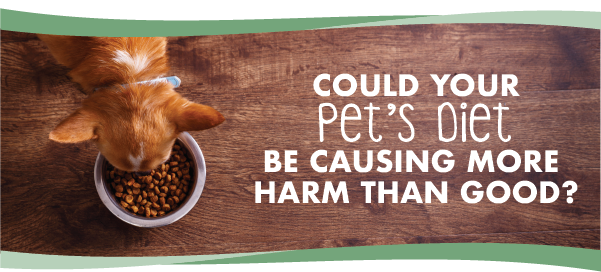If you feed your pet a grain-free or “boutique” diet—such as home-cooked meals or food with unusual ingredients and proteins from a small manufacturer—you may want to reconsider. While the diets might sound “healthy” by using words like “natural”, “organic”, or “human-grade”, research has shown that many of these “boutique” diets (with or without grain) are actually not nutritionally balanced for pets’ needs, and they can instead cause serious health problems.
Veterinary Cardiologist noted a possible link from these diets to Dilated Cardiomyopathy (DCM) in 2017, a condition with genetic links only in certain breeds. This spike in new cases extended to all breeds and breed mixes. DCM can result in abnormal heart rhythms, weakened heart contractions, congestive heart failure, syncope, and even sudden death. In June 2019, the U.S. Food and Drug Administration announced that they are currently investigating a possible link between “boutique” diets and the development of DCM in dogs. Initially it was thought that those diets might be responsible for a deficiency in taurine, an amino acid essential to heart health in pets. However, most of the pets who have been diagnosed with DCM are not lacking taurine—but all of them were being fed grain-free diets with alternative fillers, home-cooked foods, or a kibble made with a more exotic protein such as kangaroo, duck, or alligator. This leads researchers to believe that the uptick in DCM cases is related to a grain-free or other “boutique” and unusual diets.
Even more concerning than the link to DCM are other problems seen since 2011. There is an alarming trend in gastrointestinal and other severe, systemic health problems linked to these diets including increased thirst/urination, food allergies, growth problems in puppies, and even kidney enzyme elevations in young pets.
In the life of a veterinarian, it is common to regularly see patients for vomiting and diarrhea. But what is not normal is seeing young pets (1-2 years old), presenting for these symptoms on a chronic basis. Many of these pets vomit on and off every week or have on/off soft feces. Or they might go through periods of “picking” at their food without interest or constantly eating grass. Once the doctor performs a physical exam, often the first thing they notice is that the pet’s abdomen is tense. This signals that the pet is in pain or uncomfortable a form of chronic indigestion and needs treatment, specifically with prescription GI food and long-term antacids. Occasionally, a chronic GI case presents so severe that owners mistaken the behavioral changes for arthritis. These cases tend to benefit from Tramadol, as well as prescription GI food and long-term antacids.
As an AAHA-Accredited practice, our team always performs our due diligence to rule out other medical causes. However, when all diagnostics come back negative, we start to look at what is going into the pet’s body.
Over the past few years, there have been an exponential increase in these visits, and once we started looking at the food these pets were being fed, it was noticed they were all on some form of organic, natural, grain-free, or boutique diet. In many cases, the symptoms do not always appear right away but can instead appear months or even years after being on the food.
One potential culprit that might be to blame is the complex salts that are used in these diets claiming “made with no artificial preservatives” or “made with natural preservatives”. The meat and other ingredients still must be preserved in some way to maintain a proper shelf life, so instead of using traditional preservatives, they sneak in complex salts and flavorings (think MSG-like). In addition to chronic GI upset, we have seen these ingredients lead to an increase in thirst and urination because the salts wash out the kidneys. These diets can impact kidney enzymes in puppies as early as 4 months of age or lead to chronic kidney disease in some older patients. Like humans eating “fast-food”, the long-term health ramifications of eating a poor diet will eventually catch up. These preservatives and flavorings are not limited to diets. They can also be found on meat-based treats such as jerky, flavor coated bones and flavor coated raw hides.
So, what is the solution to these problems? Transition your pet’s food to one you can trust to be complete, backed by years of research, and proven to improve your pet’s quality of life. The healthiest dogs that we see day in and day out are eating Royal Canin, Science Diet, Pro Plan, Iam’s or Eukanuba. Just saying “feed an AAFCO approved diet” is not good enough anymore. Some of these boutique foods have the AAFCO seal. Within 2-3 weeks of transitioning their pets from “boutique” foods to one of the recommended diets, pet owners reported their pet’s symptoms were nearly or completely resolved.
We feel much better about our job as a veterinarian if we see more patients for wellness visits than sick visits. The current state of the pet food industry makes that nearly impossible, especially because many pet food marketing tactics encourage owners to be swept away by the latest trend, rather than trust sound science and years of clinical experience in their veterinarian.
Our hospital was founded on the premise of building relationships with pet owners through education. We will continue to share our knowledge and experience in the hopes that it can help even more pets. If you are considering a change in your pet’s food–or want to know if you should be, set up a nutrition consultation with your veterinarian. Choosing your pet’s diet is a medical decision.





